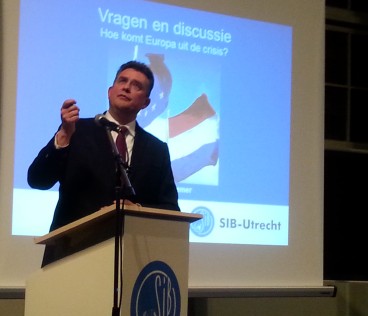Roemer: 'For cooperation but against the United States of Europe’
Roemer: 'For cooperation but against the United States of Europe’
if we want to strengthen cooperation in Europe, then we shouldn’t be charging ahead, but lending an ear to the people who don’t go along with this, who say ‘superstate no, cooperation yes’. That was the message of SP leader Emile Roemer in his lecture on Europe and the credit crisis to the Student Association for International Relations (SIB) in Utrecht.

‘A Europe that preserves peace, and promotes prosperity and democratic and social rights is a fine aim,’ Roemer stressed, adding that ‘it is precisely the federalists who threaten these worthy goals with their pushing through a superstate which is not wanted by the people. That’s exactly why we now express our support for cooperation in Europe, but why we are against the United States of Europe.’
Roemer emphasised in his lecture the need to recognise the mutual differences in Europe and to respect them. ‘The public throughout the EU expects respect for these differences, for example of how we organise care for our old people and those with disabilities, how we combat unemployment and how we provide affordable housing. Economists who point only to the economic advantages of a single Europe deny the enormous differences in culture, language and mentality that we in Europe have always had and still have.’
The SP leader looked ahead to the elections this coming May, underlining the fact that the Eurocrisis was not yet in the past and that the euro increasingly threatened to become a divisive force in Europe. 'Forcibly maintaining the euro could lead to major problems and could even become an ever greater obstacle to cooperation,’ he said. ‘That would lead to fresh conflicts, economic and political. Will the Germans and Dutch remain prepared for many more years to support countries and banks with many more billions? Will the Greeks accept that for a great deal more time it will not be their own parliament but the Troika which decides what measures will be taken? Will all inhabitants of Eurozone countries accept that they are losing control over their societies and budgets piece by piece to Brussels? I don’t think so.'
Referring to the leader of the hard right populist PVV, Roemer said that ‘if we leave the euro today as Wilders wants, tomorrow we will face huge problems, or you might as well say chaos. But uncritically hanging on to the euro, whatever the cost may be, will not help us either. I’d go further, and say that federalists who want to keep the euro on its feet at any price, could in the end become indeed the gravediggers of a European cooperation that is so dear to them. Precisely because of the need to maintain cooperation, the moment could arrive when we have to say that the euro in its present form isn’t sustainable. And in order to be well prepared for that moment we must now consider alternatives and possibilities to ensure the euro a soft landing. Whether that be via a parallel currency, through individual countries leaving the Eurozone, or what you will.’
